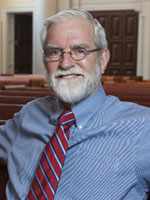
Position: Billy Graham Professor of Evangelism
Teaching at Samford since: 2005
Dr. Dorsett also is pastor of Christ the King Anglican Church, which he and his wife started after moving to Birmingham.
Why do you teach? During my sophomore year in college I knew I wanted to spend my life teaching at the college or university level. I have been teaching since receiving my Ph.D. I cannot imagine doing anything more fulfilling.
What is the one thing you want your students to know when they graduate from BDS? I want them to know that first and foremost that their identity is in Christ, and that they should always seek to know Him and glorify Him in whatever ministry they pursue.
How did your background prepare you for your current role at Samford? As [evangelism professor], I try to help students learn how to introduce Jesus Christ to non-Christians. Because I spent many years as an agnostic - indeed I am a mid-life convert and a recovered alcoholic, I know something about bondages, honest doubts about the existence of God, and the deep inner longings of hurting, confused and lost souls. I remember well what kinds of Christians turned me off as well as the folks who led me closer to Christ. In my role at Beeson Divinity School I also teach church planting and disciple making. My wife and I have been involved in planting two churches - one in Illinois and one here in Birmingham. And for more than 30 years we have been involved in making disciples of the Lord Jesus Christ who will mature and reproduce their kind.
What is one thing that most students do not know about me? My guess is that they have no idea how indebted to them I am for furthering my general education, giving me joy and helping keep me young at heart.
You have three degrees in history and special interest in World War II. How does this affect my teaching at the divinity school? I am convinced that my background in history is a good foundation for understanding people and culture. This foundation is extremely helpful for me as I help train men and women who are preparing for careers in ministry, especially in the areas of evangelism and church planting. Among numerous lessons we have learned from World War II, one is that faith in God enhances a combatant's ability to survive the stress of fighting. Evidence from [that war] reveals that soldiers who had the resources of faith and hope in God, especially if they were encouraged by good battlefield chaplains, not only suffered less battle fatigue or PSTD, they were able to help bolster the morale of their comrades. Still another lesson from the war comes from some of the highest-ranking generals who observed that chaplains and medics in the Army and corpsmen in the Navy offered so much personal care for the soldiers, sailors and marines that morale remained strong despite the dreadfully high casualties and extremely long deployments. Marine Gen. A.A Vandergrift said that chaplains and corpsmen or medics proved to be indispensible for keeping morale high. These lessons from history help me to play a part in training future military chaplains. Likewise these lessons enable us to learn how essential our faith is to finding strength to keep pressing on during all kinds painful and stressful times in life.
